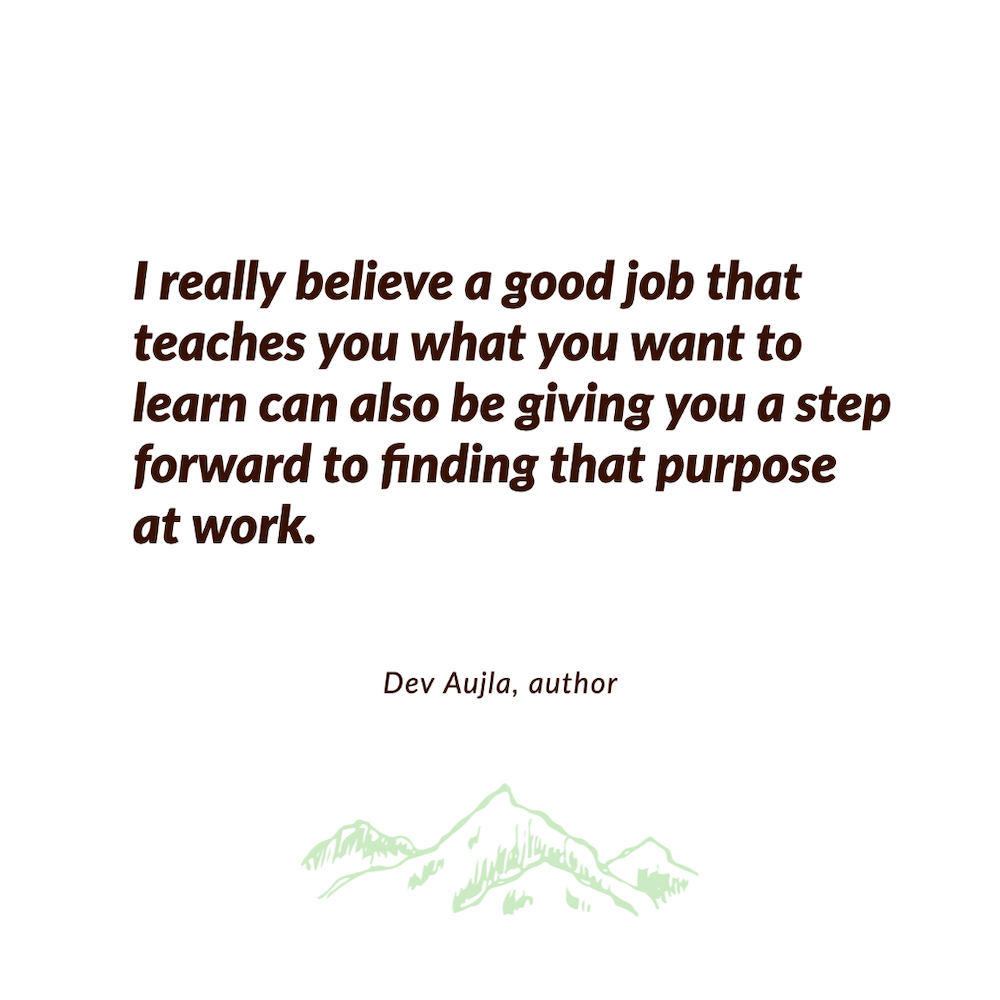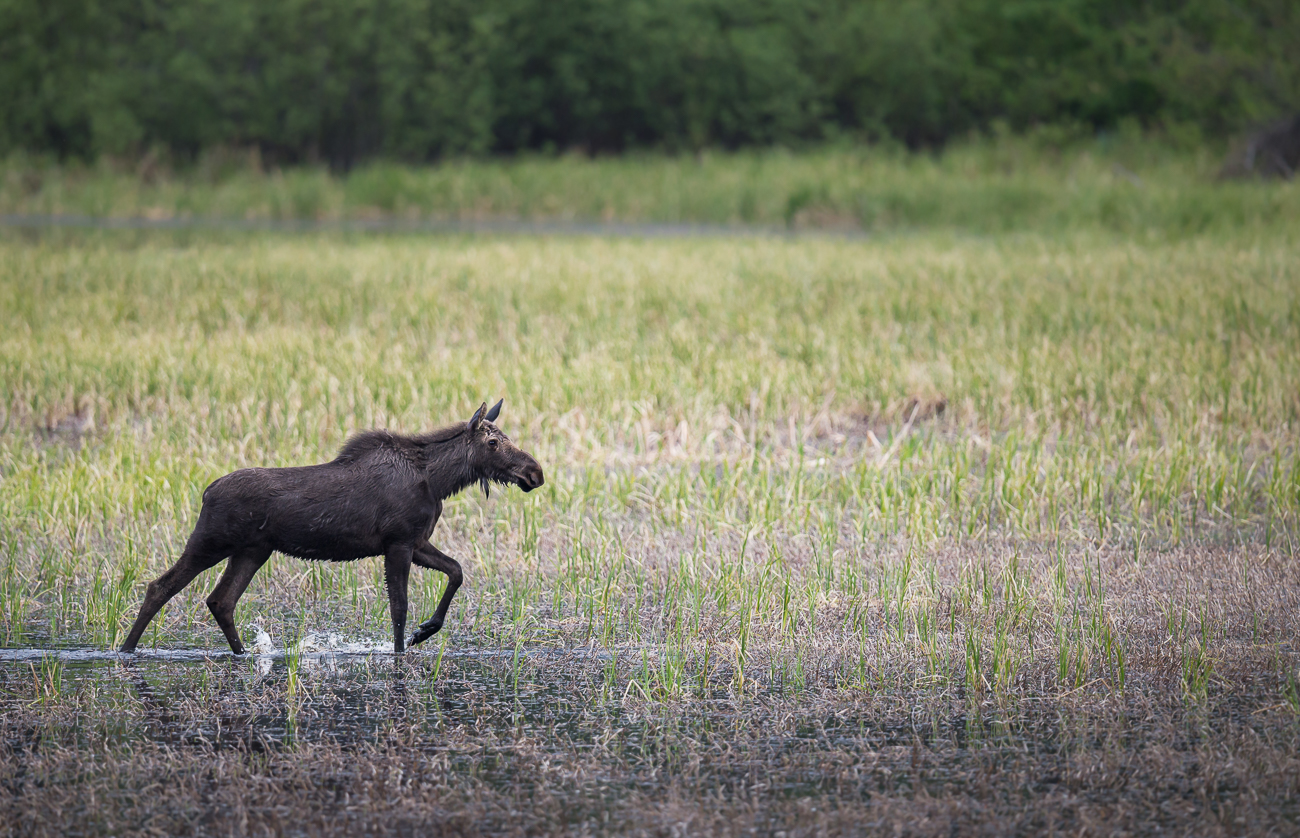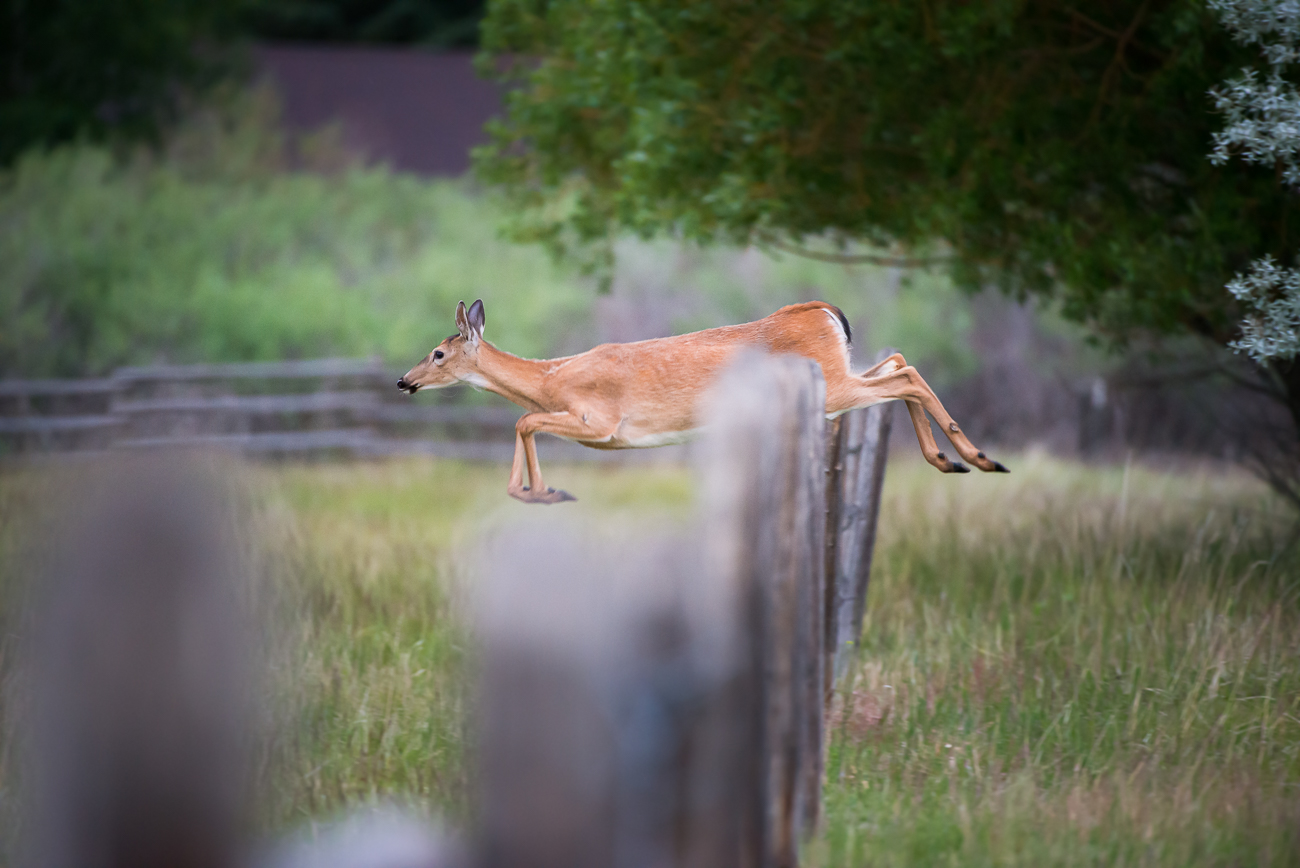One Last Thing
Chapter Eleven
By now, most of you have taken a first step – have begun to find your voice.
But what’s the nest step? And how to make these steps count – for your career, your life, the world?
 We asked Dev Aujla, author of 50 Ways to Get a Job and Making Good.
We asked Dev Aujla, author of 50 Ways to Get a Job and Making Good.
“One person I interviewed was actually in the Canadian military and he was talking about what happened after their extensive training.
“They don’t rise to the occasion. They don’t all of a sudden become a hero. You fall back into routine. And what’s interesting about that is it’s true about the ideas that we have, too.”
As Dev explains, “You need to be in the routine daily of noticing what questions come into your head, noticing what issues you see in the world and then writing them down, taking one or two steps forward. So, when the right idea – when the idea that really drives you, that feels good, that has momentum – you take a step to make the first step. You write it down. You don’t miss it.
“Because you don’t all of a sudden rise to the occasion waiting for that perfect idea, then jump and run. No, you need to be jumping and running at all the little ideas along the way. And then the ones that stick around are the ones that you end up seeing on people’s TED talks. They’re just the ideas that stuck around long enough. And there are a million other things that they were thinking about, or ways or paths that they may have gone down that they didn’t choose, that never quite make it into that conversation.”
Dev tells us, “It cannot be underestimated the idea of just taking note of your thoughts and writing them down and making sure you are being aware and starting to move in the direction of the question.”
And Dev should know. He was in the routine of being aware of his ideas as a teenager when he decided to launch DreamNow – an organization that seeks to innovate the way we do good.
Ironically, in trying to help others do good, Dev realized “there’s a lot of different ways to make money and do good. And making money and doing good doesn’t mean just working for a company that has a social impact. Making money and doing good means doing work that you feel like is bringing you closer to yourself every day, that is teaching you what you want to learn next, that is in alignment with your values, that can have a big impact on the world that you want.”
That idea is what led Dev from DreamNow to helping people find their dream job, realizing their dream impact in the process.
And here’s the thing about impact: So often it begins with learning about impact, Dev argues.
“We have thought, in the past, that our jobs are just the way to provide for ourselves and pay for our lives – and to ideally live out our values as well. But they can actually be something that enables us to learn. We can be checking things off of our ‘to learn’ list and we can be finding purpose in that every day.
 “I really believe a good job that teaches you what you want to learn can also be giving you a step forward to finding that purpose at work.”
“I really believe a good job that teaches you what you want to learn can also be giving you a step forward to finding that purpose at work.”
So, how does this work? How to combine work and learning, money and meaning? Is it as simple as searching for the dream job?
Dev says, “We’ve been using methods that are built for a very linear system. Apply for a job, all of a sudden you get a job, you’re there for 30 years. But things have shifted. The jobs that you’re going to get aren’t even jobs that exist yet. So, how do you build for that future? How do you build that kind of resiliency? There is a way to make sure that you can re-tell your story and re-shape the experiences you’ve had to set yourself up for something new: Be driven by learning throughout. That’s what actually enables you to get that next perfect job.”
How to uncover that path? We asked Dev.
“The number one thing: Being interested in the people you meet and wanting to learn from them and being interested.
“That random hobby you have? Or that question that pops in your head? Take it further than you think. Take it two steps further. Don’t just Google it and find the answer. Hold it. Hold that question for three months, or two weeks even, and go to the museum and ask that same question. Go talk to five people and ask that same question. Read a book related to it. Just take that question further than you think.
“If you get in a habit of doing that, then you will transform your career and the jobs you’re looking for and your life. And it will be more interesting. And your life will take different paths that you may never have expected.”
Dev takes this question further.
“Here’s how it works: If you have that question and you take it further, you’re going to find companies and people that are working in that space that you never would have noticed on that first Google search. You would have had your answer. You never would have found those people. You never would have found those companies. And the ones that are really interesting are the questions that stick around.”
Dev offers an example.
 “What should I have for lunch? Honestly, it could be anything. You don’t need to have a big framework; you don’t need to put that much thinking into whether it’s an interesting question. Just does it feel like it has energy? Is it still exciting? Do I still want to do it? And if you start going down a path and start looking and asking people and talking to them, it could lead you into talking to different chefs and cooks and restaurants. It could lead you into a whole world of different ways of thinking about food and different ways of thinking about lunch. And all the people that are working in that industry. And academics that are thinking about the history of where curry came from.
“What should I have for lunch? Honestly, it could be anything. You don’t need to have a big framework; you don’t need to put that much thinking into whether it’s an interesting question. Just does it feel like it has energy? Is it still exciting? Do I still want to do it? And if you start going down a path and start looking and asking people and talking to them, it could lead you into talking to different chefs and cooks and restaurants. It could lead you into a whole world of different ways of thinking about food and different ways of thinking about lunch. And all the people that are working in that industry. And academics that are thinking about the history of where curry came from.
“Do this and you’re meeting all these people along the way and, in doing that, you will have an interesting life.”
And Dev has had an interesting life – he has left his mark.
Still. What is that one thing that Dev knows now that he wishes he knew at 15?
“I think that you don’t need to be one thing. There’s lots of room in life to be many different types of people and to move through different worlds.
“And you don’t need to get it right off the bat. There’s not one answer, or one right answer, to anything. And you’ll probably be different than what you imagined anyways. Mostly, I wish I knew it’s about moving forward and keeping on going.”
Dev adds, “I used to think that this is what my life’s going to look like: I’m going to be a lawyer and get a business degree. But it’s not at all what I did. And I used to labour about what was that one thing I need to do and here’s what I’m going to do. It’s going make me successful and make a difference.
“Forget it. It’s not necessary. There’s room in life to do many different things it’s just about moving forward and starting.”
 For people and nature – for career and life – it’s always about starting.
For people and nature – for career and life – it’s always about starting.
Starting and remembering:
“Whatever you think you’re doing, if you do something that you’re passionate about, then you’re going to find the way to be happy.” – Barbara Cartwright | Welfare Advocate
“If there isn’t something you’re super passionate about yet, that’s okay too. It’s totally fine to just explore a lot of different things and just enjoy high school. Maybe you’ll find your thing once you start university. It just depends on the person.” – Isabella O’Brien | Youth Leader & Scientist
“The more that you can experiment with and the more that you can try things out from 15 to 25? Do it. Take the opportunities, be bold, try and take some risks.” – Karen Kun | Water Advocate & Entrepreneur
“Doing things when you’re younger, before university, does give you more opportunities. That being said, that shouldn’t be the reason why you’re doing things.” Isabella O’Brien | Youth Leader & Scientist
“I had a certain sense of a quest for things, but it wasn’t necessarily a quest for where I am today. It was to say, ‘Where am I going to go next? What’s the next thing I can do to build?’ So, some people in high school have a big dream to transform the world. Some people have a smaller dream just to get to the next thing, to learn something, to do something new. But it’s about having that sort of inquiring mentality and having an ability to act on it. It’s one thing to do the reading and do the research, but the ability to act on it and do something about it is what I think is critical across all personality types.” – Randall Howard | Angel Investor
“Think of your past and go: ‘When was I happiest? When was I jazzed up about life?’ Then ask, what was the component of that feeling? Everyone’s got strengths and weaknesses. You have to lock into what are your strengths. You have them. Find out what they are. Ask other people what they are.” – Jim Bottomley | Futurist
“We all have different talents and skills that can still provide that link to stewardship and conservation. It’s finding what you can offer to the world and then making sure that you’re making best use of that.” – Neil Fletcher | Biologist
“You need to be open to chasing those opportunities.” – Sandra Odendahl | Financial Executive & Engineer
“Charge into life and don’t let everyone’s expectations drive your decisions.” – Jim Bottomley | Futurist
 “I do this because I love it. And I would never do anything else. And if you are also like that – if you think that I don’t ever want to do anything else with my life and I can take it and I can push and I can be strong – then, yeah, that’s the advice that I would give: Go for it.” – Camilla d’Errico | Artist
“I do this because I love it. And I would never do anything else. And if you are also like that – if you think that I don’t ever want to do anything else with my life and I can take it and I can push and I can be strong – then, yeah, that’s the advice that I would give: Go for it.” – Camilla d’Errico | Artist
“I always tell people never be a bare minimum worker.” – Marc Lépine | Chef
“When you grow up there will be two kinds of pain in your life: The pain of discipline or the pain of regret. So, any choice you make is one of those two choices of pain. And it’s fascinating to me how simple that makes the world. Every decision you do is one of those two.” – Mohnish Kamat | Financial Executive
“We used to compete against our neighbor. Now we’re in social media land. So, we’re literally competing against everybody, all the time. Who’s going on this trip? Who’s buying that car? Who’s getting a boat? And, it’s like, you don’t need that much to live, to be happy.” – Shawn MacDonell | Creative Director & Hockey Scout
“Keep an open mind. Look for opportunities. Listen and learn as much as you possibly can. And be open to the world. That’s the most important thing. Don’t close yourself off. Don’t become a little tribe. Open yourself up, because the world is a wonderful place. And the more people you meet, the more your life gets enriched.” – Mary Young Leckie | Movie Producer